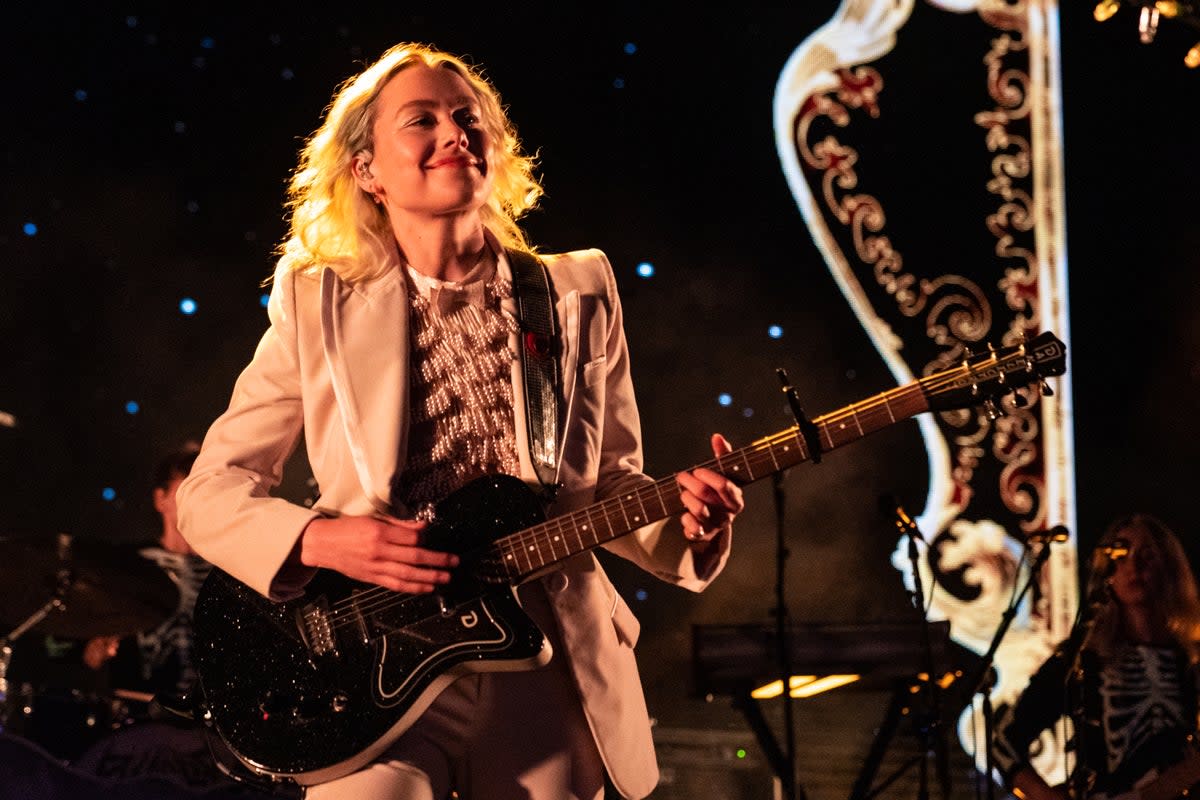Phoebe Bridgers review, Brixton Academy: A show bursting with catharsis

- Oops!Something went wrong.Please try again later.
It feels weird to see Phoebe Bridgers in real life. The singer-songwriter’s rise mid-pandemic – or as she puts it, partway through a “s*** hellstorm” – has meant she has mostly manifested as pixels on a screen. The Grammy nominee was forced to make her Jimmy Kimmel debut last year via video call from the bathtub of her LA home; she was in her pyjamas. But here she is tonight at the Brixton O2 Academy in the flesh. The thrill of Bridgers’ physical presence isn’t lost on her fans who shriek at the sight of her when she unexpectedly – but characteristically – ducks on stage early on to casually introduce her supporting act: “Wazzup?”
A veil of reverence cloaks this crowd, though. By the time Bridgers’ voice, a feathery falsetto, floats in on the wistful opening chords of “Motion Sickness”, her exquisite breakout song from 2017 about singer-songwriter Ryan Adams, the screams temper to a hush. And there they remain for “DVD Menu”, the instrumental opening to Punisher, her second album that revealed a spikier side to the gently plucked musings of her debut. Like a scene out of an Eighties horror film, the fog rolls in around her ankles (courtesy of a smoke machine that is working overtime tonight) as the looping synths and grunting strings set the scene for an evening that moves fluidly between Bridgers’ most deafening howls and her softest whispers.
In person, she is as unmediated and candid as her online presence promises. Tracks are introduced with quippy one-liners: “This song is about getting locked out of your house”; “This one is for the gays”; “This one is about alcoholics.” Her on-stage personality is an arch eyebrow and a cheeky but trembly grin. At one point, Bridgers asks the crowd: “Who here has a good relationship with their dad?” Hearing the whoops and cheers, she deadpans: “That’s nice. Now who has a s***ty relationship with their dad?” The response is considerably louder. She is also outspoken and political, and makes space for this side of herself tonight. “I have gone on this rant before but I had an abortion in October. Democracy in the States is a f***ing lie,” she calls out the recent overturning of Roe v Wade in the US. “It’s incredible to be outdone politically by a country with a royal family.”
Gigs often invite the embracing of friends, an arm slung around a shoulder or a hand held in the darkness. Tonight summons introspection, instead. Gazing up at Bridgers, people appear to retreat into themselves, into her. Her songwriting is often praised for its mutability, the way it waxes sacred and profane at once. Her lyrics prove Bridgers to be a deft writer of stories; her live shows, an equally deft teller of them. Supported by her morgue-worthy band of skeletons, including one notable trumpeter, Bridgers offers a new perspective to her older tales such as the early dirge “Funeral”.
The storybook illustrations projected on the wall behind Bridgers uphold the balance of the whimiscal and the mundane achieved in her music. They also lend the show a sense of intimacy, too. Listen to how specific and vulnerable her lyrics are and you feel as though you’re hearing snippets of a diary. The hand-drawn sketches on the wall, of a packet of Sardines or a ghost in a graveyard, give the sense we’re now seeing them, too. Often the lighting keeps Bridgers in the dark. Other times, as she kneels on the floor or stalks across the stage, her face is shrouded by a curtain of icy-blonde hair half-dyed lagoon blue. As a result, her voice seems to conjure from nowhere: a ghostly spectre in and of itself.
When the crescendo of “Kyoto” comes crashing down a couple songs in, the audience is fully immersed. It’s the first moment of catharsis in a show bursting with them. Later, Bridgers encourages the crowd to purge any remaining pain during the calamitous and stunning “I Know the End”. Smoke engulfs the stage as the illustrated house projected behind her catches fire. She has invited her supporting act Sloppy Jane back on stage and together they throw up walls of noise. Strings shriek as a celloist takes a bow to the instrument like a weapon. It’s the sonic equivalent of a rage room and Bridgers is the presiding rager, wiedling her black BC Rich Warlock electric guitar.
Bridgers’ music flourishes in melancholy. Perhaps that’s why it found the audience it did during a pandemic. Much of it is lonely music; songs about feeling lonely that are best listened to alone. There is comfort in that. But by the end of tonight, the audience and Bridgers have found solace not in solitude but solidarity. Alone but together. “Believe it or not, I’m feeling really positive,” she smiles. For a sad girl icon, Bridgers sure knows how to dispense joy.

